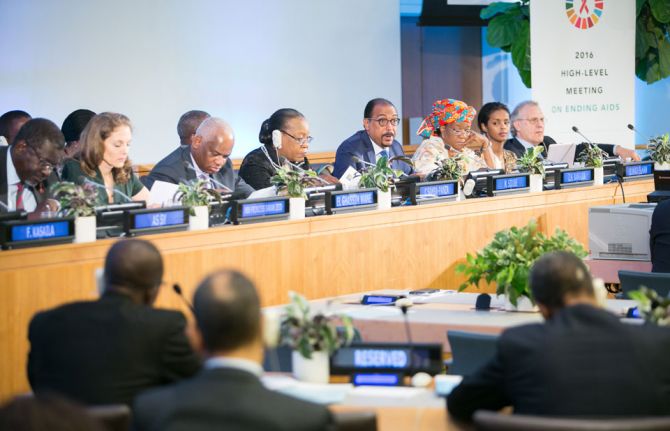








Update
HIV and security: past, present and future
07 June 2016
07 June 2016 07 June 2016If we do not address HIV among populations affected by conflict, natural disasters and emergencies, we will not see the end of the HIV epidemic by 2030. This was the stark message from leaders at a major side event taking place on the margins of the United Nations General Assembly High-Level Meeting on Ending AIDS, being held in New York, United States of America, from 8 to 10 June.
Entitled “HIV and security: past, present and future,” the event was moderated by journalist Colette Braeckman, who was joined by a panel of eminent experts. The event was organized by UNAIDS and the United Nations Department of Peacekeeping Operations and was attended by the UNAIDS Executive Director, Michel Sidibé.
In setting the scene, Mr Sidibé noted that of the 314 million people affected by emergencies and conflicts in 2013, some 1.7 million were living with HIV. It was, he argued, vital not to leave behind in the response to HIV people living with HIV and people vulnerable to human rights violations and sexual exploitation.
The participants explored exactly how and why people may become more vulnerable to HIV in emergencies and conflict situations. Women and girls especially are at risk of assault and violence every day, even in the very camps and settlements where they seek refuge. Access to HIV prevention and treatment services can be disrupted, and traditional social networks and behaviours often break down during times of crisis, increasing the vulnerability of women and girls to sexual violence and HIV. Members of key populations and young people may also be exposed to HIV through higher-risk behaviours in emergency and conflict situations.
Panellists underscored the need for renewed urgent attention to HIV, security and sexual violence in conflict settings, recalling the adoption of UN Security Council Resolution 1983 five years ago. HIV and security is unfinished business, requiring the urgent attention of the Security Council. Panellists called for the urgent elimination of all forms of sexual abuse and exploitation in UN peacekeeping missions, increased accountability for abuses, and comprehensive support to victims. UN missions and troop-contributing countries have a duty of care to the communities they serve. Upholding this duty requires a culture shift in security and military institutions.
Looking to the future, national responses need to increase strategic information on the drivers of HIV risk and vulnerability in humanitarian crises to enable resources to be targeted effectively. It was argued that well-coordinated HIV programmes should be routinely incorporated into all emergency and post-conflict preparedness and humanitarian response programmes, with cross-border and regional collaboration a priority. In addition, people living with HIV and members of key populations must be included in the development of policies and plans related to the continuity of treatment and access to HIV services. It was emphasized that peacekeeping operations should also play a key role in the HIV response in such settings and help address HIV risk factors.
One of the fundamental recommendations highlighted was the need to have plans in place to deal with the possible impact of conflict and emergencies before such situations arise. Helping to build community resilience to potential traumas so that their effect can be mitigated is essential.
Most crucially, long-term, flexible and sufficient funding must be identified to address the sexual and reproductive health needs of adolescents and young women in humanitarian and fragile settings. Without intensified and fully-resourced humanitarian response, the world will not reach the growing numbers of people affected by displacement, conflict and violence and we will not be in a position to end AIDS by 2030.
Quotes
"Humanitarian crises exacerbate the HIV epidemic. Millions of people are left behind, vulnerabilities increase, rape is used as weapon of war and violence leads to new infections. Services are disrupted, people are uprooted, their access to HIV prevention and treatment affected."
"The people most affected by conflict and humanitarian emergencies have to shape programmes. They are more than “implementing partners”. Limiting them to this role is a missed opportunity."
"We must do far more, and we must do it better, if we are to meet the needs of women and children in fragile settings. We can end this horror, but not if we persist with business-as-usual approaches."
"There are glaring gaps between international standards and the national laws that trivialize women’s traumas, or conflate crime with adultery or other issues. Women are seeking justice in its fullest sense – services, reparation and redress, not just punishment for the perpetrators. We must change the culture of security, military and justice institutions. Structural reparations mean that the dividends of peace and justice flow to all."
"We need to provide adequate pre-deployment training on HIV and HIV programming for peacekeepers in conflict settings."



